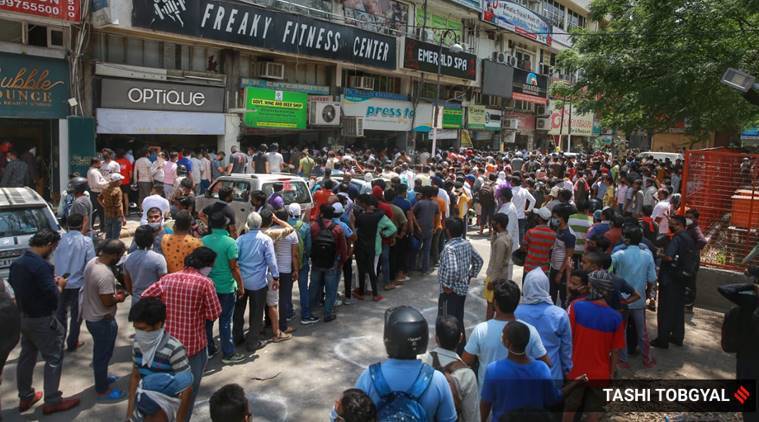[ad_1]
The Delhi government recently brought about a number of changes in the Rules governing the trade of alcohol in the national capital, which is carried out through a large network of private and state-run liquor shops that do brisk business round the year.
Among all the changes, a seemingly minor tweak in a clause relating to home delivery of alcohol drew a lot of attention, especially at a time when queuing up outside liquor stores is a proposition fraught with risks of catching the Covid-19 virus.
The amendment was notified on June 1, and it came into effect on June 11. It brought Delhi one step closer to the home delivery of liquor.
However, there are some more steps to be completed before Delhiites can get their liquor home delivered. The actual rollout requires some more work on the part of the government.
What was the June 1 notification about?
The notification amended key provisions in the Delhi Excise Rules related to home delivery, allowing microbreweries to offer takeaway draught beer, and serving liquor on terraces, rooftops, and other open spaces in restaurants and bars, among others.
 Outside a liquor shop in New Delhi. (Express Photo: Tashi Tobgyal, File)
Outside a liquor shop in New Delhi. (Express Photo: Tashi Tobgyal, File)
So did the previous guidelines not allow home delivery of liquor in Delhi?
Technically, the previous Rules also allowed home delivery of alcohol in Delhi. However, there were some peculiar conditions.
Suppliers of liquor needed to apply for an L-13 licence. Those possessing an L-13 licence could carry out such delivery “at the residences only if order is received through e-mail or by Fax (not on telephone)”.
Due to the somewhat impractical nature of the Rule, there were no takers for the licence, and thus home delivery of alcohol remained grounded.
And what did the June 1 notification change with respect to home delivery?
It simply replaced the terms “e-mail” and “fax” with “mobile apps” and “online web portals”. The amended Rule states:
“Licence in Form L-13 for home delivery of Indian liquor and Foreign Liquor by ordering through mobile app or online web portal. The licensee shall make delivery of liquor at the residences only if order is received through mobile app or online web portal and no delivery shall be made to any hostel, office, and institution.”
In simple terms, this means that a trader holding a L-13 licence can accept orders through mobile phone apps and websites for doorstep delivery of liquor.
But if the change has already been notified, why has home delivery not been launched?
That’s because the notification was only an enabler — a procedural step that amended an archaic Rule that would come in the way of rolling out home delivery, even if the government wanted to.
Now comes the more complex work: the government will have to draw up regulations to prevent the misuse of the home delivery provision, such as underage drinking, theft, among others.
Also, since the sale of liquor is a major source of revenue for the government, it would want to ensure that the provisions are airtight enough to prevent inter-state smuggling of liquor.
The government also needs to fix delivery charges, which push up liquor charges significantly, as has been seen in places such as Kolkata and Mumbai, where doorstep delivery of alcohol is already allowed.
Is the Delhi government keen on actually implementing home delivery of alcohol?
After the Supreme Court had last year observed that states should consider home delivery of liquor, particularly in the light of visuals of crowding outside alcohol shops after the first round of unlock, the Delhi government had floated the possibility of developing a web platform to accept orders for home delivery of alcohol.
But as the city gradually unlocked, and liquor shops started operating at full capacity, the plan was put on the back burner.
Even after the news of the amendment to the Rules was reported, the government appeared hesitant to embrace the changes it had itself brought.
After the Opposition BJP and Congress criticised the move, the government defensively pointed out that the notification merely tweaked an existing Rule, and that no licence had been issued to actually implement it so far.
What are the other key amendments to have been notified?
It is not that all of the earlier Rules were followed strictly; indeed, violations were aplenty, and so were underhand dealings. Among the amendments are:
- Microbreweries have been allowed to offer takeaway services of draught beer.
- Restaurants and bars have been permitted to offer roof-top and terrace dine-in services.
- Independent restaurants can now also play recorded music to entertain customers. Under the previous set of norms, they had to engage live bands.
- The amended excise Rules envisage allotment of licences to liquor traders on a zonal basis, and the setting up of super premium retail vends. Keeping this in mind, separate categories of licences have been created, while a clause has been added that no person can possess more than one wholesale Indian liquor, foreign liquor and draught beer sale licence.
- Other proposals such as the one to lower the drinking age in the capital from 21 to 18 and allow restaurants to serve liquor till 3 am need the approval of the legislature, as these can be implemented only after suitable amendments in The Delhi Excise Act, 2009.
[ad_2]














